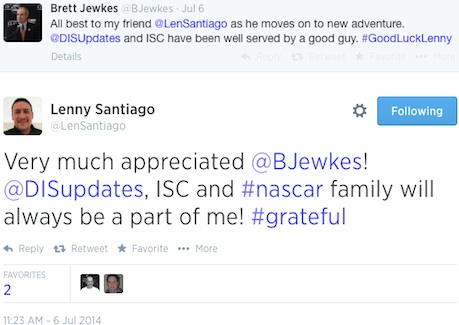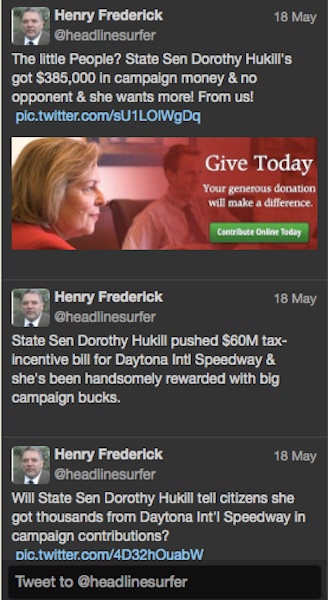

Award-winning journalist believes he was punished by track spokesman for reporting on campaign contributions to politicians who approved millions in taxpayer subsidies


DAYTONA BEACH -- The senior spokesman for Daytona International Speedway who denied media credentials for one of Florida's top award-winning reporters and publisher of HeadlineSurfer.com, is no longer employed with DIS. He took a similar job with the Orlando professional soccer team.
Headline Surfer® Publisher Henry Frederick first discovered the surprising developments with Santiago's departure early this morning when he wrote to International Speedway Corp, the umbrella company that owns DIS and 12 other tracks, for an explanation as to why there was no appeals process for the credential denial and why he hadn't even been getting the standard press releases.
Frederick sent in an electronic form requesting a renewal of the press release distribution via email when he received an automatic response email from Santiago at 7:30 a.m. that read in part, "Thank you for your email. I am no longer with Daytona International Speedway or ISC."
Brett Jewkes, a senior NASCAR marketing executive and Santiago exchanged tweets on Sunday in which Jewkes wished the former subordinate well.
Headline Surfer® was unable to reach Jewkes or Santiago for comment and messages left with the Speedway for comment on the nature of Santiago's departure went unanswered.
Frederick, who launched the 24/7 internet newspaper six years ago and has won more journalism awards in Central Florida in the past two years than any other reporter, had been a fixture at DIS races since the mid-1990s.
And through the first five years of covering the races at Daytona as publisher of Headline Surfer®, Frederick had limited media access. During Speedweeks 2013, Frederick interviewed retired NASCAR TV race announcer Ken Squier near the salad bar outside the main media room because he had lesser credentials.
Frederick was finally granted full media access during February's Speedweeks, culminating with Dale Earnhardt, Jr.'s victory in the Daytona 500, after a six-hour rain delay. Access included the main media center where he had an assigned work station and was able to have face-to-face interaction with drivers, as well as a pass to the garage, puts and grandstands. And infield media parking.
But in the weeks leading up to the deadline for credentials for the Coke Zero 400, which Frederick applied for well in advance, he got no response from the credential office nor from Santiago despite repeated calls and emails.
Then Frederick received a phone call on Friday the 13th last month from Santiago, who accused him of being a "liar" regarding when the two spoke regarding an update on how two motorcyclists were killed on the Speedway last October during a private training school race where there was an apparent collision at full throttle. There is no accident report even to this day.
Frederick was seeking an update to a story during Bike Week on biker fatalities. Santiago claimed Frederick erred in reporting when the two spoke and outright called him a "liar." He also chastised him for not covering the motor-cross motorcycle races at the track, which Headline Surfer® has never covered.
Frederick said he asked Santiago why he waited three full months if Headline Surfer® had an error in a story that had trended for weeks in the search engines, especially given Santiago's experience as a senior spokesman at one of the biggest sports venues in the country.
Santiago then tried to sidestep the issue altogether, saying he was upset that Frederick had stayed overnight in the media center, even though he was not told in advance of any curfews or any posted signs. Headline Surfer content often is moved during the overnight hours.
Frederick said he believes Santiago was making excuses to outright deny him media access because he had started to point out in tweets and Facebook postings a large amount of campaign contributions from Speedway executives like Lesa France Kennedy to select incumbent office holders at the municipal, county and state level from Volusia County.
 It was this tweet by Headline Surfer® on May 18 that first drew the ire of Daytona International Speedway officials and politicians alike in showing how State Sen. Dorothy Hukill gladly accepted big campaign contributions from the likes of International Speedway exec Lesa France Kennedy and others associated with ISC, including Mori Hosseini, the influential owner of ICI Homes of Daytona Beach and Hyatt Brown of Brown and Brown Insurance, two of the board members of ISC. On Friday the 13th of June, Headline Surfer® was informed in a phone call from DIS senior spokesmsn Lenny Santiago that its request for media credentials for the July 4th races at Daytona, including the Coke Zero 400, would not be granted. Headline Surfer® had media credentials for six years, including February's Daytona 500, when it was finally allowed a seat in the main media center.
It was this tweet by Headline Surfer® on May 18 that first drew the ire of Daytona International Speedway officials and politicians alike in showing how State Sen. Dorothy Hukill gladly accepted big campaign contributions from the likes of International Speedway exec Lesa France Kennedy and others associated with ISC, including Mori Hosseini, the influential owner of ICI Homes of Daytona Beach and Hyatt Brown of Brown and Brown Insurance, two of the board members of ISC. On Friday the 13th of June, Headline Surfer® was informed in a phone call from DIS senior spokesmsn Lenny Santiago that its request for media credentials for the July 4th races at Daytona, including the Coke Zero 400, would not be granted. Headline Surfer® had media credentials for six years, including February's Daytona 500, when it was finally allowed a seat in the main media center.
A series of tweets on May 18 by Frederick pointing out large amounts of campaign funds for State Sen. Dorothy Hukill's re-election this year, created a buzz.
Hukill already had amassed more than $300,000 in her war chest and had no opponent. She was returned to office after June's qualifying for another four years. Santiago said the Orlando Sentinel in past years had criticized the Speedway regarding campaign contributions an they weren't denied media access.
But Frederick pointed out that the Sentinel is a large metro daily with a lot more clout and access to lawyers where as Headline Surfer® is among the smallest media outlets globally. Its stories, blogs, photos and videos, however, are indexed by Google News around the clock and the internet newspaper has been accessed by visitors in 18,000-plus cities around the world in the past two years.
Frederick's findings thus far have revealed the the Speedway, its subsidiaries and prominent business leaders like ICI Homes Mori Hosseini and Brown d Brown Insurance owner Hyatt Brown, have invested heavily in select incumbents as well. Both are on the board at ISC with Lesa France Kennedy.
Frederick's investigation into the campaign contributions reveals Speedway officials have invested at least $150,000 in campaign contributions to select incumbents at the municipal, county and state levels. And the Speedway has since received upwards of $154.5 million in taxpayer subsidies for its two big projects -- the massive retail village across from the track dubbed "One Daytona" and the "Daytona Rising" grandstand modernization.
Both projects have been described by the Speedway as costing close to a billion. Daytona Rising was started last year and construction on One Daytona is expected to begin in the next few months. Both are expected to be completed in in early 2016.
Here's a breakdown in taxpayer-borne funding for the Speedway: $24.5 million from the Daytona Beach City Commission, $20 million from the Volusia County Council, $90 million from the Florida Legislature and signed by the governor and a pledge of $20 million from the Florida Department of Transportation for two additional pedestrian walkways over International Speedway Boulevard.
Frederick, while working on this investigative report, wrote to Speedway and NASCAR senior officials protesting the media credential ban, but his pleas went unanswered.
Frederick was given an infield ticket purchased by a friend, but didn't attend Thursday's practice, with the evening session called off because of rain. He also stayed home for Friday's race, delayed for 90 minutes because of heavy thunderstorms. Instead, he covered the Fourth of July fireworks in Sanford where he lives.
Frederick stayed home as well Saturday night, recognizing the Sprint Cup race race would likely be postponed, which it was with NASCAR re-scheduling it for Sunday morning because of the rain. Frederick parked off site and attended the race, but left after the race was red-flagged on lap 10 because of rain.
Without media access or WiFi, Frederick said there wasn't much more he could do. He was able to get photos from friends and pieced together a story from MRN radio on the drive home and on TNT's broadcast.
Frederick last received DIS track press releases on June 25, though he was able to get Fourth of July race-related content through NASCARMedia.com, of which he has been signed up with as a member of the working press for the past five years.
Frederick, one of the most experienced court reporters in the Sunshine State, was the only reporter among a dozen who witnessed the execution of serial killer Aileen Wuornos nearly 13 years ago to win a journalism award.
Earlier this year, Frederick wrote to a federal judge on the eve of a mortgage fraud trial in Orlando. involving defendants and properties in the Daytona Beach area pointing out serious conflicts of interests. This was after learning the judge was a trustee in a bank that did business with an unindicted co-conspirator who was a witness for the government.
The judge recused himself hours after Frederick published a story on the conflicts and a visiting judge presided over the trial.
Frederick covered the George Zimmerman murder trial in Sanford last summer, winning journalism awards two consecutive years from the Florida Press Club in the process; first for an exclusive video interview with slain victim Trayvon Martin's parents at a large rally in Miami and the second for trial coverage.
Frederick, who has been a fixture at Daytona International Speedway races since the mid-1990s when he was a metro reporter for the Daytona Beach News-Journal for nearly a decade, covered Teresa Earnhardt's complicated civil trial that led to a circuit judge sealing her late husband's autopsy photos in the wake of his last-lap crash in the 2001 Daytona 500.
He won several awards for his in-depth report on a Texas Motor Speedway shareholders legal fight with NASCAR for a second rate date shortly after that track opened, with NASCAR eventually granting the second race date.
Two years ago, he won a first place blog award from the Florida Press Club for writing about fulfilling a childhood dream of covering the Daytona 500 as a reporter.
Frederick believes the Speedway media credential ban is unprecedented and unwarranted.
"This is a black eye for NASCAR in denying a member of the working press media credential access and they can't un-ring the bell with what was done," Frederick insisted. "Hopefully, there will be some kind of resolution. It's not right, but as a new media representative, all I can do is let the public know that when you report the news that nobody else is willing to touch you can get stomped on. And that's what happened here."
Headline Surfer® Publisher Henry Frederick believes the Speedway media credential ban is unprecedented and unwarranted.
"This is a black eye for NASCAR in denying a member of the working press media credential access and they can't un-ring the bell with what was done," Frederick insisted. "Hopefully, there will be some kind of resolution. It's not right, but as a new media representative, all I can do is let the public know that when you report the news that nobody else is willing to touch you can get stomped on. And that's what happened here."
